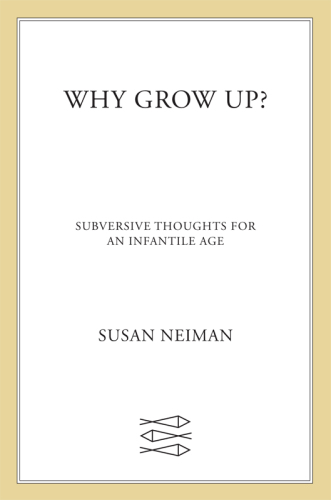
Why Grow Up?
Subversive Thoughts for an Infantile Age
کتاب های مرتبط
- اطلاعات
- نقد و بررسی
- دیدگاه کاربران
نقد و بررسی

Starred review from April 6, 2015
Accessible philosophy doesn't get much better than this insightful review of what Enlightenment thinkers such as Kant and Rousseau have to offer people today. from Neiman (Moral Clarity), director of the Einstein Forum in Potsdam, tackles questions that are widely relevant: How do different kinds of experience help and hinder "our understanding of the way the world is, and the way it should be?" And "how do we prepare a child for a world that is not the way it should be?" Along the way, she offers piercing critiques of consumerist culture, illustrating how luxury creates "false needs that make us dependent," and of American society, in which citizens are distracted from the real issues by a bewildering array of choices about relative trivialities. Neiman's sense of humor ("Yes, even Kant could write straightforward sentences") is a plus, but her greatest strength is her ability to distill centuries of thought to their essence, provoking her readers along the way. Neiman convincingly makes the case that growing up is not tantamount to "inevitable decline," and that the hard work to make maturity fulfilling is worth the effort.

February 15, 2015
Moral philosopher and Einstein Forum director Neiman (Moral Clarity: A Guide for Grown-Up Idealists, 2008) examines the conundrum of juvenescence versus coming of age. While a select few glide into maturity with a sense of privileged ease, the author surmises, others dread it and opt for years in denial. Throughout her erudite defense of adulthood, Neiman emphasizes that "growing up is more a matter of courage than knowledge" since it takes a certain bravery to eschew the "dogmas of childhood" and, however disillusioned one may become by it, thrive within the world as it truly exists. Tailored for the highly literate reader more than the casual, Neiman's intuitive assertions reference the lives and works of 18th-century Enlightenment thinker-philosophers Immanuel Kant and Jean-Jacques Rousseau, whose opposing viewpoints on coming of age bolster her greater central theme. Kant philosophized that immaturity resulted from a lack of personal fortitude, and for those stuck in the "mire of adolescence," there's a resistance to acknowledge the gap between an idealistic and a reality-based worldview. Rousseau claimed that the creation of a well-adjusted adult begins with the re-evaluation of the child-rearing process, as evidenced in his outspoken treatise Emile. Neiman articulates the differing aspects affecting maturity, such as education, travel and employment, while arguing against painting adulthood as the "dimming of sparkle" because "by describing life as a downhill process, we prepare young people to expect-and demand-very little from it." The author, whose previous books delved into the prospects of both moral nobility and wickedness, juxtaposes these divergent philosophies with dexterity and clarity. Her opening declaration that Peter Pan is "an emblem of our times" remains a resonant-if debatable-statement imploring our culture to act its age regardless of cultural influence or emotional convenience. A scholarly, persuasive assessment of the significance of achieving mental and social maturity.

April 15, 2015
Neiman (director, Einstein Forum, Germany; Moral Clarity) seeks to address our apprehension and fear of growing up. She explains that philosophy can help us not only get over this fear, but also assist with determining how to live a fulfilling adult life. She uses the writings of Immanuel Kant and Jean-Jacques Rousseau to show that becoming an adult involves reflecting on our experiences along with learning to think for ourselves. With philosophy as a tool, we can get past the uncertainty of our youth and become provoked into analyzing life and asking difficult questions to form our own judgments and ideas. As Neiman puts it, "being grown up is itself an ideal," and one that should be viewed with joy rather than disdain. VERDICT Neiman's view on using philosophy to guide ourselves into adulthood is a wonderful example of how the writings of past philosophers can be applied to our current lives. Her writing is accessible for those without a background in philosophy, and her book is a pleasant introduction to those unfamiliar with Kant and Rousseau. [See Prepub Alert, 11/24/14.]--Scott Duimstra, Capital Area Dist. Lib., Lansing, MI
Copyright 2015 Library Journal, LLC Used with permission.

























دیدگاه کاربران